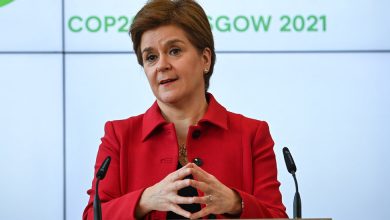Even as Biden Pushes Clean Energy, He Seeks More Oil Production

GLASGOW — President Biden told a global climate summit on Monday that “we only have a brief window before us” to reduce the emissions from burning oil, gas and coal that pose an “existential threat” to humanity. But only days earlier, he was urging the world’s largest oil producers to pump more of the fossil fuels that are warming the planet.
The incongruity was on center stage both at the global climate summit currently taking place in Scotland, and in Rome this past weekend during a gathering of leaders from the 20 largest economies. The president’s comments highlighted the political and economic realities facing politicians as they grapple with climate change. And they underscored the complexity of moving away from the fossil fuels that have underpinned global economic activity since the Industrial Age.
“On the surface, it seems like an irony,” Mr. Biden said at a news conference Sunday. “But the truth of the matter is — you’ve all known; everyone knows — that the idea we’re going to be able to move to renewable energy overnight,” he said, was “just not rational.”
Mr. Biden’s words have drawn fire from energy experts and climate activists, who say the world cannot afford to ramp up oil and natural gas production if it wants to avert catastrophic levels of warming. Environmental groups are intensely watching to see how the president intends to meet his ambitious goal of halving the nation’s emissions, compared to 2005 levels, by the end of this decade.
A recent International Energy Agency report found that countries must immediately stop new oil, gas and coal development if they hope to keep the average global temperature from increasing 1.5 Celsius above preindustrial levels, the threshold beyond which scientists say the Earth faces irreversible damage. The planet has already warmed 1.1 degrees Celsius.
“We are in a climate crisis. There is no room for the left hand and the right hand to be doing different things,” said Jennifer Morgan, executive director at Greenpeace International. “It’s not credible to say you’re fighting for 1.5 degrees while you’re calling for increased oil production.”
With gasoline prices rising above $3.30 a gallon nationwide, Mr. Biden over the weekend urged major energy producing countries with spare capacity to boost production, part of a larger effort to pressure OPEC countries and Russia to increase the supply of oil. He was joined by Emmanuel Macron of France, whose country hosted the 2015 meeting in Paris where 200 countries agreed to collectively tackle global warming.
At the conclusion Sunday of a Group of 20 summit that ended with lofty rhetoric on climate but fewer concrete actions than activists had hoped, Mr. Biden addressed the irony head on. The transition to lower-emission sources of energy would take years, and in the meantime, it was important to ensure that people can afford to drive their cars and heat their homes, he said at a news conference.
“It does, on the surface, seem inconsistent,” the president said, “but it’s not at all inconsistent in that no one has anticipated that this year we’d be in a position — or even next year — that we’re not going to use any more oil or gas; that we’re not going to be engaged in any fossil fuels. We’re going to stop subsidizing those fossil fuels. We’re going to be making significant changes. And it just makes the argument that we should move more rapidly to renewable energy — to wind and solar and other means of energy.”
Mr. Biden’s climate and social spending plan pending in Congress does not eliminate government subsidies for fossil fuels, which are estimated to be about $20 billion annually.
His comments came as the president and his aides are struggling to parry Republican attacks linking his economic agenda to rising inflation, including higher gasoline prices, which are helping to drive down his approval ratings.
Mr. Biden has shown a high sensitivity to the politics of the pump. He repeatedly rebuffed efforts by Republican senators earlier this year to raise federal gasoline taxes — a move economists widely say would discourage oil demand — over concerns that they would place an undue burden on middle-class Americans and violate his pledge to increase taxes on people earning less than $400,000 a year.
Middle class Americans “have to get to their work. They have to get in an automobile, turn on the key, get their kids to school,” Mr. Biden said at the news conference. “The school buses have to run.” He said the idea “that there’s an alternative to walk away from being able to get in your automobile is just not realistic; it’s not going to happen.”
The president’s answers in some ways echoed the executives of several large oil and gas companies, who testified last week before a House panel investigating the role of their industry in disinformation aimed at slowing down a transition to wind, solar and other clean energy. As Democrats on the committee tried to extract promises from the executives that they would phase out oil and gas development, Republicans noted that Mr. Biden was asking the companies to increase production.
“Oil and gas will continue to be necessary for the foreseeable future,” Darren Woods, C.E.O. of Exxon Mobil, told the committee. “We currently do not have the adequate alternative energy sources.”
Mr. Biden’s legislative agenda seeks to speed the migration away from oil in several ways. The large spending bill pending in Congress includes $550 billion in climate initiatives, largely concentrated in tax credits to incentivize solar power, electric cars and other technologies meant to reduce emissions. A separate piece of legislation, a bipartisan infrastructure bill, includes a down payment on Mr. Biden’s goal of building out a national network of electric-vehicle charging stations.
But those initiatives have not yet passed. And even if they do, they could take years to begin to bend American consumer preferences away from gasoline-powered vehicles, a lag that administration officials repeatedly cite in explaining his push for more oil production in the short term.
“If he were asking them to boost their production over five years, I’d quit,” John Kerry, Mr. Biden’s special presidential envoy for climate, told reporters Sunday. “But he’s not. He’s asking them to boost production in this immediate moment.”
Mr. Kerry maintained that as the world expands wind and solar energy and invests in new transmission networks to carry that renewable electricity to homes and businesses, it will “liberate” countries from dependence on fossil fuels.
“But you can’t just shut down everybody’s economy across the planet and say, ‘OK, we’re not going to use oil’ or whatever,” Mr. Kerry said.
Some energy analysts agreed, saying that while the timing of Mr. Biden’s request for increased oil production may be awkward, doing so reflects economic reality. “There’s a difference between the world we have today and the world we want in the future,” said Jason Bordoff of the Columbia Climate School at Columbia University.
“It makes perfect sense for the Biden administration to simultaneously seek to make sure there’s adequate and affordable energy for households today and at the same time take the most aggressive measures in U.S. history to spur vehicle electrification and move beyond oil in the future,” he said.
In its road map detailing how to slash global carbon dioxide emissions by midcentury, the International Energy Agency urged ending sales of new gasoline-powered vehicles by 2035; phasing out by 2040 power plants that burn coal, oil and gas without capturing their emissions; and creating a global energy sector based largely in renewables by 2050.
The I.E.A. also warned that emissions are still rising and that the world is still going in the wrong direction, failing to grasp the massive transformation of the global energy system required to keep the planet safe.
The World Meteorological Organization reported last month that the amount of heat-trapping greenhouse gases in the atmosphere reached a record level in 2020, despite an economic slowdown caused by the pandemic, and is rising again this year. Meanwhile, China is expanding coal production and imports in response to power shortages the past several months.
Justin Guay, director of global strategy with the Sunrise Project, a nonprofit group that advocates for a global transition away from oil, gas and coal, said the United States and other nations need to immediately halt new fossil fuel production.
“Net zero lives or dies on whether we move beyond fossil fuels,” said Mr. Guay, whose group is not affiliated with the Sunrise Movement activist group. “That starts with an immediate halt to the expansion of coal, oil and gas. Not next year or next decade. Right now.”



